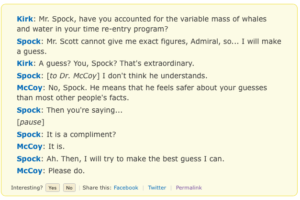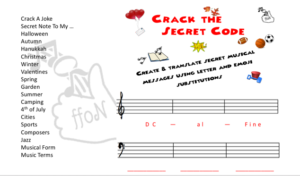Giving Your Best Guess
My favorite quote about guessing comes from a Star Trek movie. No, I haven’t finally lost it. Please bear with me. Here’s the full text from IMDB.
How do we get to the point where our guesses are solid predictions as reliable as facts? Is it pure talent and intuition when we sing or play an unfamiliar melody and somehow know how a phrase will end? What about when we play with others and can anticipate correctly what they will do next?
Good Guessing
Predicting or guessing is based on our knowledge and experience. Our experience of style—baroque or romantic, Chopin or Mozart, boogie or blues—informs us as we anticipate what will happen. I know there is some degree of musical intelligence going on too but am convinced that successful guessing can be nurtured.
The more we can anticipate what will happen the faster we can process and learn new music.We base our musical predictions on stored knowledge plus visual, aural (a combination of ear training plus works we have listened to), and tactile input. If one of these areas is weak then our guesses will be flawed. So, making sure those 4 areas are balanced is crucial in nurturing guessing.
Students are often taught to learn pieces by reading only and reprimanded heavily for mistakes. There is a time and a place for the perfect practice method and it is important to develop discipline in learning music. However, doing so exclusively can stunt a student’s growth by limiting practice at prediction. Improvising questions and answers and trading off finishing phrases are wonderful ways to improve musical guesses.
Teachers can belittle a student’s efforts by saying something like, “That was just guessing. Keep your eyes on the page and do it right this time.” I like to get to why they thought a certain thing would happen and say something along these lines, “That was a great guess. Can you tell me why Mr. Clementi did it differently?” Phrasing feedback this way keeps things positive and encourages students to try making an informed guess again. They also become increasingly able to trust their brain and senses to work together to help them as they read and play.
Bad Guessing
Yes, there is bad guessing too. One of my pet peeves is a written assignment that can be completed by guessing and uses minimal musical reasoning. Yes, I mean those note practice sheets that use words and sentences. I’m a fan of reasoning but not in this case because the reasoning is not directed toward the purpose of the activity which is note identification.
The student is supposed to read the notes, identify them and discover a word or a sentence. In my experience, most students guess the word based on their knowledge of the English language and without considering or sometimes even knowing most of the notes at sight. This is clearly not the kind of guessing that will help them learn music.
So, I designed a series of note activity sheets I call Crack the Secret Code. I took out the questionable guessing and added a fun cypher spin on using words and sentences to reinforce note identification and notation skills. Students have fun solving and creating musical puzzles using letter and emoji substitutions. Most activities that translate words into notes use only ABCDEFG. The code cyphers I have created use the entire alphabet. Some even include emojis!
questionable guessing and added a fun cypher spin on using words and sentences to reinforce note identification and notation skills. Students have fun solving and creating musical puzzles using letter and emoji substitutions. Most activities that translate words into notes use only ABCDEFG. The code cyphers I have created use the entire alphabet. Some even include emojis!
28 Sheets are included in this set. Themes include holidays, camping, sports, composers, music terms, knock-knock jokes, seasons, garden, cities, secret notes to send, and more. Crack the Secret Code sheets are designed to be usable with any reading method. The “codes” use letter names rather than locations on the staff. Students and teachers can tailor each sheet to the student’s level and on most sheets there is space for the student to create their own words and write them using “code”.
Keep nurturing the good guessing people!


